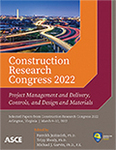Dimensions of Innovation in Project Delivery Method Selection for Highway Projects
Publication: Construction Research Congress 2022
ABSTRACT
Innovation is an important driver for project delivery method (PDM) selection on infrastructure projects. However, the literature review indicated a gap in explicitly defining the term in the context of PDM selection for transportation projects. This study employed data from 20 interviews with subject matter experts (SMEs) and found that innovation can be defined through two major dimensions: project characteristics and innovation opportunities. Project characteristics include the inherent project elements that increase complexity and can be categorized into traffic challenges, design elements, and project constraints. Innovation opportunities relate to exogenous elements where constructors can apply innovative solutions; they include traffic handling, developers’ resource and schedule optimization, and design and construction methods. An expert panel from the Texas Department of Transportation validated the defined innovation dimensions and their use in the PDM selection process. The experts qualitatively evaluated the innovation and complexity levels of 32 projects and found that traffic challenges most often contribute to increased project complexity.
Get full access to this article
View all available purchase options and get full access to this chapter.
REFERENCES
Bosch-Rekveldt, M., Jongkind, Y., Mooi, H., Bakker, H., and Verbraeck, A. (2011) “Grasping project complexity in large engineering projects: The TOE (Technical, Organizational, and Environmental) framework.” International Journal of Project Management, 29, 728–739.
Built Environment Industry Innovation Council. (2009) “Built Environment Procurement Practice: Impediments to Innovation and Opportunities for Changes.” Accessed February 16, 2021, <https://eprints.qut.edu.au/27114/1/Furneaux_-_BEIIC_Procurement_Report.pdf>.
CDOT (Colorado Department of Transportation). (2014). “Project Delivery Selection Matrix.” Business Center. Accessed March 16, 2020, <https://www.codot.gov/business/designsupport/innovative/pdsm>.
Creswell, J. W., and Miller, D. L. 2000. “Determining validity in qualitative inquiry.” Theory Pract. 39 (3): 124–130.
De Zoysa, S., Russell, A. D., and Tawiah, P. (2004) “Innovation potential of the private sector and its relation to the project delivery mode.” 1st Int. Conf., World of Construction Project Management, Toronto.
Demetracopoulou, V., O’Brien, W. J., and Khwaja, N. (2020) “Lessons Learned from Selection of Project Delivery Methods in Highway Projects: The Texas Experience.” J. Leg. Aff. Dispute Resolut. Eng. Constr., 2020, 12(1): 04519040.
Geraldi, J. G. (2009) “What complexity assessments can tell us about projects: dialogue between conception and perception.” Technology Analysis & Strategic Management, 21(5), 665–678.
Glaser, B., and Strauss, A. (1967). The Discovery of Grounded Theory Aldine Publishing Company, Hawthorne, NY.
Khwaja, N., O’Brien, W. J., Martinez, M., Sankaran, B., O’Connor, J. T., and Hale, W. (2018). “Innovations in Project Delivery Method Selection Approach in the Texas Department of Transportation.” Journal of Management in Engineering, 34(6): 05018010.
Lieber, E., Weisner, T., and Taylor, J. Dedoose software. California: Sociocultural Research Consultants (2011).
Martin, P. Y., and Turner, B. A. (1986). “Grounded theory and organizational research.” The journal of applied behavioral science, 22(2), 141–157.
Newcomer, K. E., Hatry, H. P., and Wholey, J. S. (2015) Handbook of Practical Program Evaluation. John Wiley & Sons, Inc., Hoboken, New Jersey.
Salter, A., and Gann, D. (2003) “Sources of ideas for innovation in engineering design.” Research Policy, 32(8), 1309–1324.
Tawiah, P. A., and Russell, A. D. (2008) “Assessing Infrastructure Project Innovation Potential as a Function of Procurement Mode.” Journal of Management in Engineering, 24(3): 173–186.
USDOT - Federal Highway Administration (FHWA). (2005). “Innovation in Vertical and Horizontal Construction: Lessons from the Transportation Industry.” Accessed May 20, 2020, https://www.fhwa.dot.gov/construction/pubs/if05025/if05025.pdf.
Information & Authors
Information
Published In
History
Published online: Mar 7, 2022
Authors
Metrics & Citations
Metrics
Citations
Download citation
If you have the appropriate software installed, you can download article citation data to the citation manager of your choice. Simply select your manager software from the list below and click Download.
